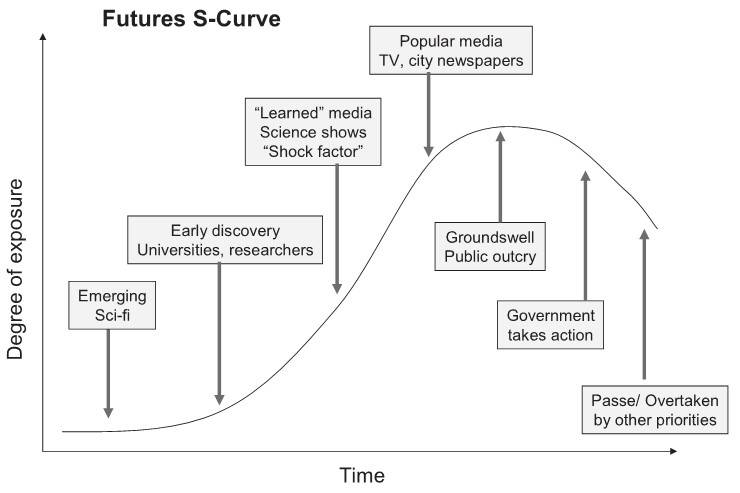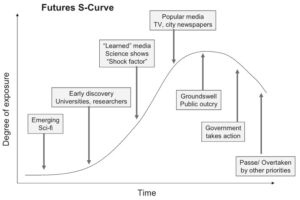
Thinking about the future is a skill to empower the imagination beyond current trends and to have a sense of the seedlings of change and how to prepare for them as drastic changes occur. We live in an era where we coexist with existential issues like climate change, pandemics, economic crisis, intergeneration conflict, global polarization and more. Thinking about the future helps us to identify threats to sustainability, take advantage of emerging opportunities, develop shared visions of a desirable future and build plans and strategies to achieve that future. According to UNESCO futures literacy is an equally important skill as reading and writing.
A decade ago I was introduced to the Futures S-curve by Sohail Inayatullah, which provides a simple deconstruction of almost any emerging issue in the world. There will be sense makers, nerds and visionaries, who will be sensing disruptive change at an early stage, but they will usually be shunned. Eventually there is enough evidence for the media to pick up an issue and sound the alarm. Ironically governments are the last in acknowledging and reacting to any issue. By that time a lot of water has already crossed under the bridges.

A recent case in point is the doctor-in-law phenomena in Pakistan. There are about 85,000 female doctors who have completed their medical education at the expense of the state or privately, but they are not part of the medical workforce in Pakistan. Most of them are victims of the “trophy wife” phenomenon, the brain drain to developed countries, and some have simply chosen not to practice medicine.
Pakistan has sharply felt the pinch of this medical brain drain phenomenon during COVID. However, if we turn back the clock a decade and a half ago, many of us were actually “introduced” to this phenomenon in our homes, communities and surroundings. Around 15 years ago, there used to be hushed murmurs of the neighbour’s daughter or the newly wed bride in the community who got married due to her medical degree but that she was not allowed to continue her medical profession. As per the Futures S-curve, at that time, few people had the foresight or sense to foresee this becoming a social issue, a decade later.
As a futurist my fear of the future is that in a post-COVID world, with doctors in short supply, developed countries like the US and in the European Union could turn to countries like Pakistan to close the supply-demand gap. This will leave countries like Pakistan with their own substantial shortage of dwindling medical professionals. This is an issue of the near future, which needs to be attended today while we still have some manoeuvering space.
Likewise, when I work with academic departments and universities, there is a growing realisation that we are losing a lot our female graduates, who are not practicing what they spend years learning. For example our architecture departments have a ratio of 7:2 for females versus males. Ironically males are mostly hired as they can be used in the field and there is less certainty about their return to work after marriage. A lot of these graduates are making their mark in online portals but there is still a lot of bias towards hiring them.
Similarly, academics from sciences and engineering lament the loss of their female graduates, for employability issues or the dowry wife phenomena or simply a degree as a migration tool. The medical corundum was discovered as a result of the inquiry into our failure to achieve the Millenium Deveopment Goals (MDGs). Since there are no longitudinal studies being done on this aspect of brain drain, my fear of the future is that we will be very late in acknowledging and responding to these emerging issues.
The World Futures day is a reminder that there is a need to develop futures sensing capabilities to survive and thrive in an uncertain and disruptive future. Developing futures thinking capabilities and fostering a futures-thinking mindset will help us to be better equipped to prepare, plan and innovate to create the future we hope for.
A decade ago I was introduced to the Futures S-curve by Sohail Inayatullah, which provides a simple deconstruction of almost any emerging issue in the world. There will be sense makers, nerds and visionaries, who will be sensing disruptive change at an early stage, but they will usually be shunned. Eventually there is enough evidence for the media to pick up an issue and sound the alarm. Ironically governments are the last in acknowledging and reacting to any issue. By that time a lot of water has already crossed under the bridges.

A recent case in point is the doctor-in-law phenomena in Pakistan. There are about 85,000 female doctors who have completed their medical education at the expense of the state or privately, but they are not part of the medical workforce in Pakistan. Most of them are victims of the “trophy wife” phenomenon, the brain drain to developed countries, and some have simply chosen not to practice medicine.
Pakistan has sharply felt the pinch of this medical brain drain phenomenon during COVID. However, if we turn back the clock a decade and a half ago, many of us were actually “introduced” to this phenomenon in our homes, communities and surroundings. Around 15 years ago, there used to be hushed murmurs of the neighbour’s daughter or the newly wed bride in the community who got married due to her medical degree but that she was not allowed to continue her medical profession. As per the Futures S-curve, at that time, few people had the foresight or sense to foresee this becoming a social issue, a decade later.
As a futurist my fear of the future is that in a post-COVID world, with doctors in short supply, developed countries like the US and in the European Union could turn to countries like Pakistan to close the supply-demand gap. This will leave countries like Pakistan with their own substantial shortage of dwindling medical professionals. This is an issue of the near future, which needs to be attended today while we still have some manoeuvering space.
Likewise, when I work with academic departments and universities, there is a growing realisation that we are losing a lot our female graduates, who are not practicing what they spend years learning. For example our architecture departments have a ratio of 7:2 for females versus males. Ironically males are mostly hired as they can be used in the field and there is less certainty about their return to work after marriage. A lot of these graduates are making their mark in online portals but there is still a lot of bias towards hiring them.
Similarly, academics from sciences and engineering lament the loss of their female graduates, for employability issues or the dowry wife phenomena or simply a degree as a migration tool. The medical corundum was discovered as a result of the inquiry into our failure to achieve the Millenium Deveopment Goals (MDGs). Since there are no longitudinal studies being done on this aspect of brain drain, my fear of the future is that we will be very late in acknowledging and responding to these emerging issues.
The World Futures day is a reminder that there is a need to develop futures sensing capabilities to survive and thrive in an uncertain and disruptive future. Developing futures thinking capabilities and fostering a futures-thinking mindset will help us to be better equipped to prepare, plan and innovate to create the future we hope for.

